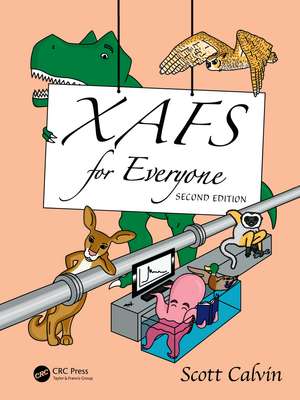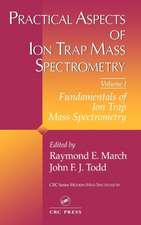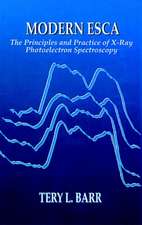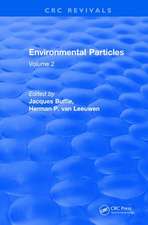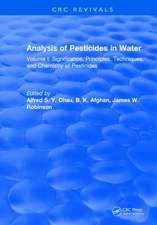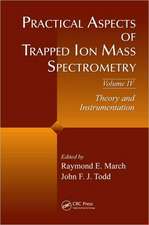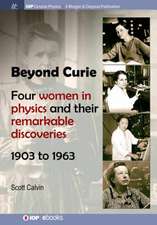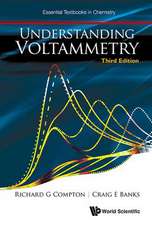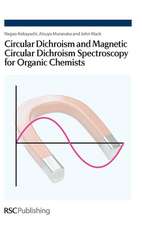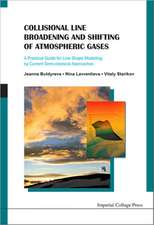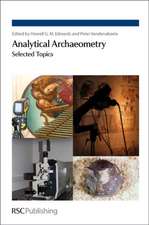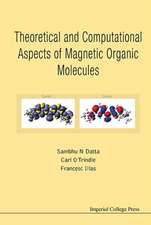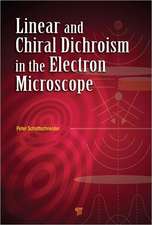XAFS for Everyone
Autor Scott Calvinen Limba Engleză Hardback – 22 iul 2024
This second edition now includes chapters on spatial and temporal resolution, alternative measurement modes including resonant inelastic x-ray scattering (RIXS) and high-energy resolution fluorescence detection (HERFD), and an expanded chapter on experimental design. In addition, this edition adds new sections on wavelet transforms, blind source separation, free electron lasers, and theoretical XANES standards, as well as three new case studies.
XAFS for Everyone covers sample preparation, data reduction, tips and tricks for data collection, fingerprinting, linear combination analysis, principal component analysis, and modeling using theoretical standards. It describes both near-edge (XANES) and extended (EXAFS) applications in detail. Examples throughout the text are drawn from diverse areas, including materials science, environmental science, structural biology, catalysis, nanoscience, chemistry, art, and archaeology. In addition, eight case studies from the literature demonstrate the use of XAFS principles and analysis in practice.
The text includes derivations and sample calculations to foster a deeper comprehension of the results. Whether you are encountering this technique for the first time or looking to hone your craft, this innovative and engaging book gives you insight on implementing XAFS spectroscopy and interpreting XAFS experiments and results. It helps you understand real-world trade-offs and the reasons behind common rules of thumb.
Key Points:
- New cases studies will be added to the end of the book
- Multiple sections are being refreshed or almost completely re-written to reflect the changes in the field since the first edition. For example: important new synchrotron light sources have come in to operation across the world, including NSLS-II in North America, MAX IV and Solaris in Europe, the Taiwan Photon Source in eastern Asia, and SESAME in the Middle East. New analysis software has been developed, while other software has fallen in to disuse.
- Discussions of wavelength dispersive detectors will be added throughout the book, as well as wavelet transforms
| Toate formatele și edițiile | Preț | Express |
|---|---|---|
| Paperback (1) | 664.11 lei 6-8 săpt. | |
| CRC Press – 20 mai 2013 | 664.11 lei 6-8 săpt. | |
| Hardback (1) | 631.34 lei 3-5 săpt. | +39.01 lei 7-13 zile |
| CRC Press – 22 iul 2024 | 631.34 lei 3-5 săpt. | +39.01 lei 7-13 zile |
Preț: 631.34 lei
Preț vechi: 693.79 lei
-9% Nou
Puncte Express: 947
Preț estimativ în valută:
120.81€ • 129.18$ • 100.73£
120.81€ • 129.18$ • 100.73£
Carte disponibilă
Livrare economică 27 martie-10 aprilie
Livrare express 13-19 martie pentru 48.100 lei
Preluare comenzi: 021 569.72.76
Specificații
ISBN-13: 9781032745480
ISBN-10: 1032745487
Pagini: 444
Ilustrații: 452
Dimensiuni: 210 x 280 x 33 mm
Greutate: 0.98 kg
Ediția:2
Editura: CRC Press
Colecția CRC Press
Locul publicării:Boca Raton, United States
ISBN-10: 1032745487
Pagini: 444
Ilustrații: 452
Dimensiuni: 210 x 280 x 33 mm
Greutate: 0.98 kg
Ediția:2
Editura: CRC Press
Colecția CRC Press
Locul publicării:Boca Raton, United States
Public țintă
Postgraduate and ProfessionalCuprins
Front Matter Part 1: The XAFS Experiment 1. XAFS in a Nutshell 2. The Hardware: Light Sources, Beamlines, and Detectors 3. Spatial and Temporal Resolution 4. High-Energy-Resolution Techniques 5. Experimental Design 6. Sample Preparation 7. Data Reduction 8. Data Collection Part 2: XAFS Analysis 9. Fingerprinting 10. Linear Combination Analysis 11. Principal Component Analysis 12. Curve Fitting to Theoretical Standards Part 3: Modeling 13. A Dictionary of Parameters 14. Identifying a Good Fit 15. The Process of Fitting 16. Starting Structures 17. Constraints Part 4: XAFS in the Literature 18. Communicating XAFS 19. Case Studies
Notă biografică
Scott Calvin has been using x-ray absorption fine structure (XAFS) since 1998 to study systems as diverse as solar cells, magnetic nanoparticles, soil samples, battery cathodes, analogues to atmospheric dust particles, and pigments used in 18th-century paintings. Dr. Calvin is currently the director of the prehealth program at Lehman College of the City University of New York, helping students their achieve their dreams of becoming physicians, dentists, pharmacists, veterinarians, and more.
Descriere
This second edition now includes chapters on spatial and temporal resolution, alternative measurement modes including resonant inelastic x-ray scattering (RIXS) and high-energy resolution fluorescence detection (HERFD), and an expanded chapter on experimental design.
Recenzii
"The book is very timely … It is unique in covering theoretical background and experimental details to data analysis in a way that is easy to understand. It will be very valuable to anyone who is interested in using x-ray spectroscopy by helping them to better design and get more out of their experiments."
—Dr. Chi-Chang Kao, Director, SLAC National Accelerator Laboratory
"The author has found fun and engaging ways to explain details of XAFS that otherwise can seem so dry. I am sure that folks who use my beamline and software will love XAFS for Everyone."
—Dr. Bruce Ravel, National Institute of Standards and Technology
"A unique presentation with great value for readers and special emphasis on practical aspects … a ‘must have’ for XAFS scientists and beamlines."
—Prof. Mark C. Ridgway, Department of Electronic Materials Engineering, Australian National University
"This book will be useful to graduate students, post docs, and researchers. I highly recommend it."
—Dr. Richard W. Strange, Molecular Biophysics, The University of Liverpool
—Dr. Chi-Chang Kao, Director, SLAC National Accelerator Laboratory
"The author has found fun and engaging ways to explain details of XAFS that otherwise can seem so dry. I am sure that folks who use my beamline and software will love XAFS for Everyone."
—Dr. Bruce Ravel, National Institute of Standards and Technology
"A unique presentation with great value for readers and special emphasis on practical aspects … a ‘must have’ for XAFS scientists and beamlines."
—Prof. Mark C. Ridgway, Department of Electronic Materials Engineering, Australian National University
"This book will be useful to graduate students, post docs, and researchers. I highly recommend it."
—Dr. Richard W. Strange, Molecular Biophysics, The University of Liverpool
